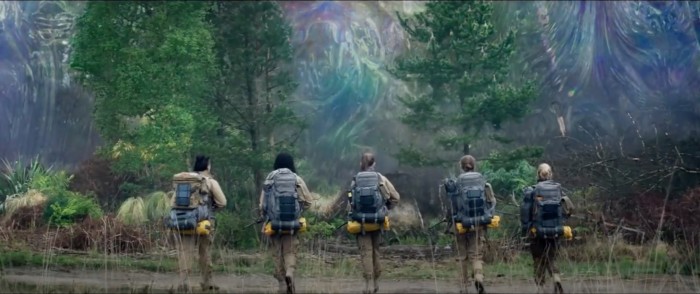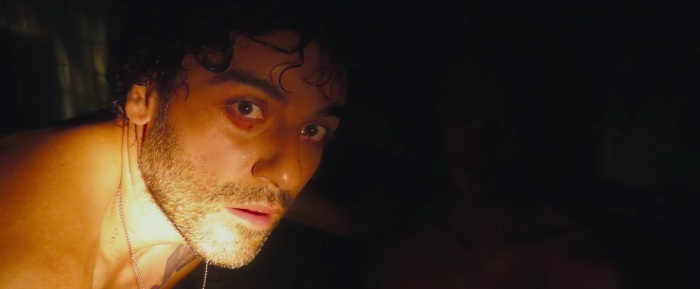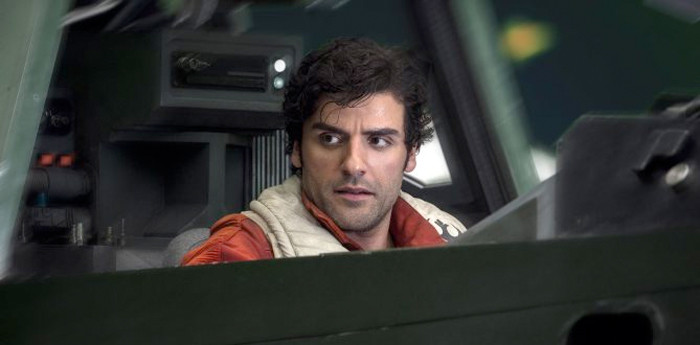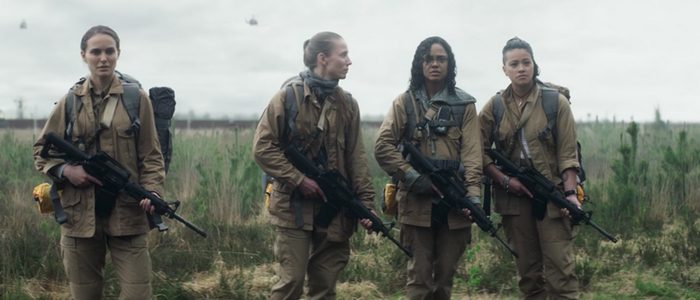Alex Garland And Oscar Isaac On 'Annihilation,' The Film's Behind-The-Scenes Clashes, And More [Interview]
Writer/director Alex Garland set a high bar for himself with Ex Machina, his stellar 2015 directorial debut. That sci-fi movie had a lot on its mind, but his newest film, Annihilation, is far more cerebral. It's one of the most challenging movies of the year: bold, beautiful, and haunting in a way that occasionally verges on being experimental.
Not long ago, I had the opportunity to sit down with Garland and actor Oscar Isaac, who plays a key role in the film, to talk to them about bringing this story to the big screen. We touched on the film's behind-the-scenes clashes, whether or not Garland was concerned with audiences being able to keep up with what he's doing in this movie, Isaac's approach to his troubled character, and much more. Read our full Oscar Isaac and Alex Garland interview below.
Warning: Both Garland and Isaac occasionally drop spoilers in a couple of their responses. If you're 100% spoiler-averse, I'd suggest bookmarking this and reading it after you see the film. Our interview follows.
***
For me, watching this movie was like walking through a beautiful nightmare. I have not read Jeff VanderMeer's book yet, but can you tell me about how you crafted the visual aspects of being inside The Shimmer?
Isaac: Sure. (laughs)
Garland: (To Isaac) Go on, do it. (laughs) Yeah, we knew we wanted it to be beautiful and disturbing, often concurrently within the same shot. So really, what happened was, there's a script. And in the script it's straightforward in many respects, because it says, like, say, this scene, you'd say, 'INTERIOR. HOTEL BAY. Three people sit around a coffee table.' But then of course, production designers and set decorators need to make it something where you can stick a camera. So the script was disseminated among the collective, the group of people who work together, many of whom I've worked with for a long time – some of them twenty years. Me and [set decorator] Michelle Day and Mark [Digby] on the production design team, [producer] Andrew [Macdonald] – we've worked together on seven or eight movies, so we know each other backwards.
It all goes out, and really what happens is, a conversation starts. Everybody's got a voice, and everybody's chipping in, and an organic, evolutionary process begins and it doesn't really stop. It doesn't really stop until the picture's locked. Right in the 59th minute of the twelfth hour, or whatever the right thing to say is, in the grade, these things are being affected hugely. How much do you saturate the colors? Where do you choose to desaturate? Where do you choose to put a bright point in the screen and do we have a vignette on the shot to focus? So it never really stops. It's a big collective all working together and getting there organically.
Isaac: But at the same time, nudging it towards 'What's most disturbing?' As an example, without trying to give away too much stuff, the 'fight' scene at the end between the alien and Lena. I was there for a lot of those rehearsals, and just seeing – it's such an ephemeral thing. Why is it more disturbing if she's less aggressive here, but pushing into her? Why is it weirder if this movement happens as opposed to this movement? It's hard to say why, but it's one of those things where we wouldn't think of it, but then (nods to Garland) you'd suggest it, and suddenly we were all like, 'Yep. That's definitely creepier.' Something as subtle as, this alien being, all it is is intention. So seeing the physicality of that idea happen. The collaborative part is, you say that, and then we have to interpret that. How do you physicalize just intention? Then somewhere that alchemy comes together, and everyone gets on the same page and creates something really crazy.
By the end, Kane turns out to be unlike any character you've played before. But in the beginning, I was noticing a couple of similarities to the soldier you voice in the Homecoming podcast. Did you think about that character at all when you were making this?
Isaac: Oh, is that right? No, I didn't. That one, he was a private. Sure, he had kind of gone through some weird stuff, but I think with that one, there was a bit of an innocence. Kane maybe has...it's a little bit of a different thing. There's a deeper, darker bubbling thing underneath him.

As the film goes on, it feels increasingly impressionistic and almost experimental at certain points. Were you worried at all about audiences not being able to keep up?
Garland: No. Not really. That's not to say there's anything to do with ignoring audiences. It's not that. But it has to do with what you're concerned with in relation to the audience, you know? For example, the kind of area where I'd think about it a lot would be to do with strangeness. So the film was, in some ways, conceived backwards. There was this crucial aspect to me that began as Natalie's character is walking along the beach, and then contains the sequence within a lighthouse. I knew that was the goal, and I knew that I wanted us collectively to achieve a particular level of strangeness and beauty and oddness. Things like the dance sequence that Oscar was just alluding to. It needed to have information, but not information that was stated. It was more inferred. They key thing would be about strangeness, right? What it feels like to watch it. The crucial thing is what would it feel like? So then, you have to think, 'How do you construct feeling?'
One of them, say in the case of strangeness, is that there's a diminishing return with it. So if you begin strange, by the time you get to the end strange, you've got acclimatized to it and you've lost the thing that you're shooting for. So that created a built-in structure, which on set and in pre-production, we used to call 'suburbia to psychedelia,' because it sounds neat and it's a nice reduction. It's a nice sound byte, isn't it? But it's got truth in it. Because if you start in suburbia, you start in our world, it gives you the chance of getting truly strange, in a way. So everything was sort of structured that way.
Along those same lines, there were some heavily publicized behind-the-scenes clashes about the making of this movie. I know you're someone who's not afraid to speak your mind, so I'm just wondering if you're pleased with how it all turned out.
Garland: I only really give a shit about the film, OK? That's actually all I care about. So as long as the film honors the intent of the collective, I'm basically happy. That's what I care about. I think we did everything we could, and I'm proud of it, and I love it, so I'm fine with it.

I'm curious about your process. What kinds of conversations did you guys have about Kane, and was there a moment when you were developing your take on him where everything clicked for you?
Isaac: (Jokingly) Yeah, I had it all figured out, and I walked in and said, 'Shut up. Sit down. And point the camera at this.' (points at his own face)
Garland: He set the lens. There was some discussion about the lighting, but Oscar won. That's the way it goes.
Isaac: (laughs) Yeah, we talked. That's what we do. We like to talk a lot and we think about things in similar ways, I like to think, and we have a similar sense of humor. So I think my first question was, 'I know it's not Predator with girls, but tell me why it's not Predator with girls.' No, I'm kidding. I just read it and thought it was fascinating and thought it was so strange and so beautiful, and I wanted to play this character. What was so cool is that he has all this stuff bubbling underneath, as I was saying, so that's what was most interesting to me. There was almost a Pinter-esque quality to it, where there's all these pauses and all of this subtext that's just emanating out of these two people. But they don't say it. Like Alex said, it's inferred. So we spoke a lot about that. 'What is it that's happening underneath, and what is the nature of this relationship? What do I know now that I'm not saying? In this scene, now what do I know? What does she know?' Trying to map those things out. Everything had a palpable energy between the characters.
Then coming up with different ideas: 'Where might he be from? What if I try making his voice sound a little like this? What do you think about that?' And then at the end, just the nature of the energy of how do we do this speech at the end that's being filmed? What's the reason we're filming it? What's the intent of it? Getting very specific about that stuff. That's what a lot of it felt like. And with Alex, it always feels like we're building a motorcycle together, or building a car. We're just kind of handing each other the tools and making it together. That's what's really fun about it.
Garland: It was actually all built backwards. So for me, for what it's worth, the whole thing was about earning the speech that Kane says at the end in this locked off shot that just sits there and lets him do it. It's about the words that are contained there and the things he's expressing there. Everything else is in support of that moment. The whole film actually is in support of the last thirty minutes, basically. Which sounds like a sort of stupid thing to say, because truly all films are. But actually that's not exactly true. In a way, every single thing that happens is just inching your way towards this strange metaphysical sequence. And having it not as just abstract firework fun, but having content.
Isaac: Or pain. I think what the last thirty minutes are just this metaphysical pain and despair in some ways.
Garland:(To Oscar, jokingly) That's how you're choosing to sell the movie? Are you out of your fucking mind?
Isaac: Let's go back to Predator with girls. Predator with girls! (laughs)
Garland: It's true, though. It's true.

With this and Star Wars, you're a part of two big recent sci-fi movies that proudly feature women at the forefront of the cast, which is really cool. I know you're separated from a lot of the ensemble here, but tell me about working with Natalie on this.
Isaac: I was shooting Star Wars at the exact same time, too, so that was a wild thing to –
Wait, you were jumping back and forth between sets?
Isaac: It was literally the same studio.
Oh, cool.
Isaac: So some days I would walk from – I think I still used my trailer from Star Wars...
Garland: Yeah, we didn't have trailers. But there were days where you were, on the same day, shooting both things.
Isaac: Yeah, there were. I would shoot something in the morning and then have a little bit of down time and then switch it up. So that was wild.
Garland: We'd catch him at his lunch break and say, 'We've got to shoot this now!' (laughs)
Isaac: I think I visited, too, still dressed up as Poe on the set.
Garland:Yeah, totally.
Isaac: It was pretty wild. It reminded me a little of Pee-Wee's Big Adventure, when he's on the lot and you see all the different actors walking around. There was something very classic about it. So there was very little time, and not a lot of rehearsal time, and Natalie and I didn't know each other. It happens in movies, obviously – you have to suddenly be very intimate with someone very quickly. I think the fact that she was willing to trust me and I was trusting her, and we just went in there and did it and tried to find a real intimacy. Which is always a weird, awkward, strange thing to do suddenly in front of a bunch of people. But we found that, and I really enjoyed those scenes with her. She is very focused, but also in those scenes, very emotionally available as well, so I really enjoyed that.
Garland: It makes me want to name-check Rian [Johnson] and Ram [Bergman], the producer on Star Wars [The Last Jedi]. I think because they come from an indie film background, here they are making like the biggest movie of all time, and they were unbelievably helpful and accommodating to us. And they really didn't have to be at all. Most big productions would not even dream of doing that. And they went out of their way – whilst making fucking Star Wars, for Christ's sake – to help this really small movie next door. It was very cool and I'm truly grateful for it, actually.

Making a movie with all female protagonists almost feels like a political statement today. Was that something that specifically drew you to this?
Garland: I really just want to dodge that question.
Really?
Garland: Yeah. The answer that I'm saying – which I've said before, so I apologize for it, but I'm in a position where this is the answer that I have – is that the previous film that Oscar and I worked on together [Ex Machina] had within it a very conscious set of deliberate arguments which related to gender and objectification. As well as other stuff about sentience and AI and all of that kind of thing. And what interested me about this project was the absence of an argument. So if I now talk about that, I dismantle the absence of the argument. So I'd just like to leave it at that.
Understood. You wrote this long before the Times Up and Me Too movements came to light, and I certainly don't want you to explain the ending of your movie, but there's some symbolism and imagery at the end that could be interpreted as being aligned with those causes. Does the film feel even more relevant now than when you wrote it, considering what's going on culturally?
Garland: No, it doesn't. I can't lay claim to that. I wouldn't want to. For me, it was a film, internally – by the way, let me just say, any time you present a narrative, in a book or a film or whatever the fuck it is, what is really happening is that fifty percent of the narrative is not provided by you. It's provided by the subjective nature of the person receiving the narrative. So they fill in gaps, they provide stuff, they create agendas, whatever it happens to be. That is not problematic to me, that is just in the nature of the job. Right? For me, personally – so it doesn't have to be for you – in as much as it is about something, which it is, to me, it is about the nature of self-destruction. It was about an observation I made, which is that everybody appears to be self-destructive. Some people are very obviously self-destructive because they're addicted to heroin or alcohol or they act in a psychotic way or whatever, and they offer their self-destruction to you. Other people are very comfortable in their own skin, and they've got a fantastic job and a fantastic life and everything seems to be bulletproof. They feel like they've sort of cracked something about life. But then when you get to know them, you discover odd bits of self-destruction, which then become significant bits of self-destruction. It was the universality of it, that even the people who'd cracked it all had not cracked it all. And then I started trying to think –
Isaac: Where does it come from?
Garland: Where does it come from? Why is it that you have a really good marriage and you dismantle it? Why do you have a really good friendship and you dismantle it? Why do you have a really good job and you dismantle it? Whatever it happens to be. And the film essentially presents that question and an answer to that question by inference. To me, that is what it's about.
*****
Annihilation hits theaters on February 23, 2018.
